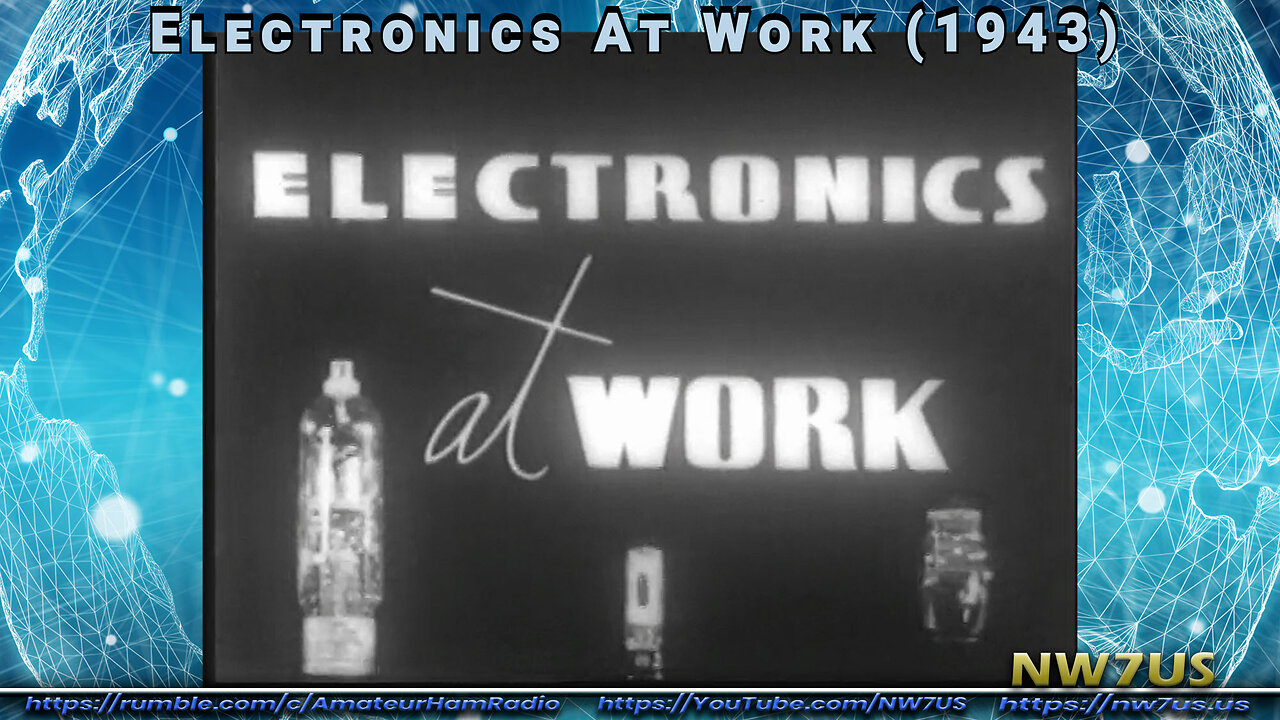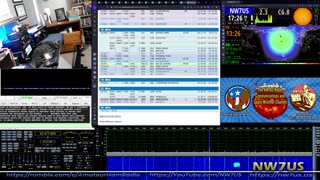Premium Only Content

Vacuum Tubes - Electronics at Work: 1943 Educational Film
In the classic educational film titled "Electronics at Work," produced by Westinghouse in 1943, viewers are introduced to the fascinating world of vacuum tubes. This film highlights the crucial role these devices played in both military and commercial sectors, including radio telecommunications, radar, and various industrial applications. The narrative suggests that vacuum tubes provided the United States with a significant advantage during World War II, particularly in enhancing communication and technology.
The Continuing Relevance of Vacuum Tubes
Despite advances in technology, vacuum tubes remain in use today for several applications, including:
- Transmitting radios
- Medical devices
- Audio amplification systems
- High-frequency applications
Understanding Vacuum Tubes
The film outlines the six basic functions of electronic tubes and illustrates how each type is employed in different industrial and military contexts.
Structure of a Vacuum Tube
A vacuum tube typically consists of two or more electrodes housed within a vacuum inside an airtight enclosure. Key features include:
- Electrode Types: Most vacuum tubes have glass envelopes, although some utilize ceramic or metal casings with insulating bases.
- Leads and Sockets: The electrodes connect to leads that pass through the envelope via an airtight seal. These leads often take the form of pins, allowing for easy replacement in a tube socket, as tubes were a common point of failure in electronic devices.
- Capacitive Design: Some tubes feature a top cap on the electrode to minimize interelectrode capacitance, enhancing high-frequency performance and maintaining safety by separating high voltages.
The Evolution of Vacuum Tubes
The earliest vacuum tubes emerged from incandescent light bulbs, which contained a heated filament sealed in an evacuated glass envelope. When heated, the filament releases electrons into the vacuum through a process known as thermionic emission.
- Electrode Functionality: A second electrode, known as the anode or plate, attracts these electrons if it holds a more positive voltage. This mechanism results in a flow of electrons from the filament (cathode) to the plate, creating an electric field due to the potential difference between them.
- Diode Function: A vacuum tube with two electrodes is termed a diode, which functions as a rectifier. Diodes allow current to flow in only one direction, converting alternating current (AC) into pulsating direct current (DC). This technology is widely used in DC power supplies and in demodulating amplitude-modulated (AM) radio signals.
Film Availability and Production Details
This film is available in the public domain under Creative Commons, and it can be accessed through the Library of Congress Prelinger Archives. The film has been edited and converted to HD quality for better viewing. Introductory and closing music is provided by Nero 10, with commercial use rights granted.
This film not only serves as an educational tool but also highlights the enduring legacy of vacuum tube technology in the realm of electronics, illustrating its significant contributions to both past and present technological advancements.
Please subscribe to my YouTube Channel: https://YouTube.com/NW7US
Also, please click on the bell, to enable alerts so that when I post a new video, you will be notified. By subscribing and making sure that the bell (alert) notification is set to ALL, you will be kept in the loop for new videos and more.
About me:
https://nw7us.us
Direct Support:
1. Donate - https://sunspotwatch.com/support.html
2. Become a Patreon Member - https://www.patreon.com/NW7US
Highlights: I am a contributing editor with propagation and space weather columns in The Spectrum Monitor - http://www.thespectrummonitor.com/
Social media:
X: https://X.com/NW7US (@NW7US)
Tumblr: http://blog.nw7us.us
Instagram: https://instagram.com/nw7us
Facebook: https://www.Facebook.com/NW7US
Facebook: https://www.Facebook.com/spacewx.hfradio
Copyright, Tomas Hood / NW7US
-
 16:07
16:07
Amateur Ham Radio Shortwave (LF, MF, HF, VHF, UHF, SHF) Communications + Space Weather
1 year agoHistoric Maritime Morse Code Station KPH on Shortwave - 10 August 2024
472 -
 LIVE
LIVE
ItsLancOfficial
9 hours agoFREAKY FRIDAY-GETTING FRIED-WELP! #TOTS
88 watching -
 1:09:11
1:09:11
Sarah Westall
5 hours agoRead the Signs: Are We Already Operating in a New Financial System? w/ Andy Schectman
27.6K4 -
 1:32:53
1:32:53
Flyover Conservatives
9 hours agoRicky Schroder Exposes How Hollywood Planted Him as a Child Star | FOC Show
31.3K4 -
 LIVE
LIVE
JahBlessCreates
3 hours ago🎉 TEKKEN TING, and maybe some music...
199 watching -
 LIVE
LIVE
GritsGG
4 hours agoTop 250 Ranked Grind! Dubulars!🫡
54 watching -
 LIVE
LIVE
StuffCentral
3 hours agoStar Stuffy
21 watching -
 6:02
6:02
Blackstone Griddles
5 hours agoPrime Rib Brisket Burgers on the Blackstone Griddle
9.38K2 -
 LIVE
LIVE
HELMETFIRE
3 hours ago🟢HELMETFIRE PLAYS: Silksong Part 4🟢
39 watching -
 1:14:07
1:14:07
Glenn Greenwald
10 hours agoGlenn Takes Your Questions: Billionaires, Bari Weiss and Journalism | SYSTEM UPDATE #509
69.5K34